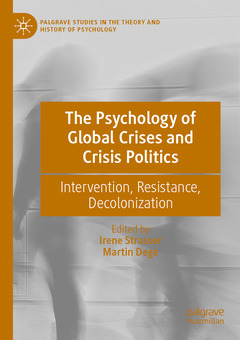Description
The Psychology of Global Crises and Crisis Politics, 1st ed. 2021
Intervention, Resistance, Decolonization
Palgrave Studies in the Theory and History of Psychology Series
Coordinators: Strasser Irene, Dege Martin
Language: English
Subjects for The Psychology of Global Crises and Crisis Politics:
Publication date: 11-2022
360 p. · 14.8x21 cm · Paperback
Publication date: 11-2021
360 p. · 14.8x21 cm · Hardback
Description
/li>Contents
/li>Biography
/li>Comment
/li>
Interdisciplinary in scope and wide-ranging in its perspectives, this timely work will appeal to students and scholars of theoretical and political psychology, critical psychology, and cultural studies.
1. Crises, Politics, Psychology – An Introduction (Irene Strasser & Martin Dege).- 2. Assembling the Psycurity Accord in response to the early COVID-19 outbreak in Aotearoa New Zealand (Veronica Hopner, Darrin Hodgetts, Stuart Carr, Nick Nelson, Kerry Chamberlain, Rhys Ball).- 3. Amerindian paths through recurrent sociocultural crises (Danilo Silva Guimarães).- 4. The Pandemic is a Mirror: Decolonizing Psychology and Racism in Times of COVID-19 Crisis (Sunil Bhatia).- 5. The Sense of a Pandemic: Test, trials, and turbulence in the Indian subcontinent (Nandita Chaudhary).- 6. Necropolitics, Epistemic Injustice, and the Recurring Crises of Psychology (Henderikus Stam).- 7. Psychologies Otherwise & Earthwise: Pluriversal Approaches to the Crises of Climate, Equity, and Health (Wade E. Pickren).- 8. Eco-Anxiety and Psycho-Terratic Paradigms of Practice: A View From Australia (Paul Rhodes).- 9. Lockdown Vistas: Time, Space, Solidarity, Action (Erica Burman).- 10. Pandemic, Fatalism, and Psychology’s Paralysis: How to Promote the Strengthening of People and Groups in Brazil? (Raquel Souza Lobo Guzzo).- 11. Preparing for the Wrong Emergency: Visions of Generation Changing Events (Langdon Winner).- 12. Pseudo-Science and ‘Fake’ News: ‘Inventing’ Epidemics and the Police State (Babette Babich).- 13. Crisis within Crisis within Crisis: Global Pandemic; Mass Unemployment; Anti-Capitalist Critique? (David Fryer).- 14. The Covid-19 Pandemic and the Crisis of Signification in Israel/ Palestine: Biopolitics, Reinvented Communism, and Conspiracy Theories (Jamil Khader).- 15. Viral Resistance (Ian Parker).- 16. Essay on Fascist Subjectivity (Thomas Teo).- 17. Decolonize Psychology (Martin Dege & Irene Strasser).
Irene Strasser is Assistant Professor at St. Bonaventure University, NY, USA. Her research focuses on lifespan development and cultural psychology with an emphasis on adult development and aging. Her work is informed by critical gerontological perspectives, social justice studies, and qualitative approaches.
Martin Dege is Assistant Professor of Narrative Inquiry at Pratt Institute in Brooklyn, NY, USA. His research investigates how crisis experiences shape our everyday lives and the narratives we tell. He is also interested in the history of psychology as a discipline




